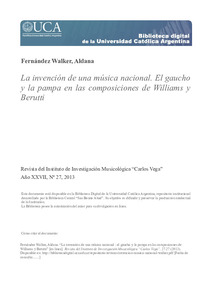Please use this identifier to cite or link to this item:
https://repositorio.uca.edu.ar/handle/123456789/982| Título: | La invención de una música nacional : el gaucho y la pampa en las composiciones de Williams y Berutti | Autor: | Fernández Walker, Aldana | Palabras clave: | MUSICA ARGENTINA; COMPOSICION MUSICAL; MUSICA; Williams, Alberto, 1862-1952; Berutti, Arturo, 1858-1938; CULTURA NACIONAL; GAUCHO | Fecha de publicación: | 2013 | Editorial: | Universidad Católica Argentina. Facultad de Artes y Ciencias Musicales. Instituto de Investigación Musicológica Carlos Vega EDUCA |
Cita: | Fernández Walker, Aldana. “La invención de una música nacional : el gaucho y la pampa en las composicones de Williams y Berutti” [en línea]. Revista del Instituto de Investigación Musicológica “Carlos Vega”, 27.27 (2013). Disponible en: https://repositorio.uca.edu.ar/handle/123456789/982 | Resumen: | Resumen: La concepción negativa del gaucho y de la pampa como símbolos de la barbarie se revertirá lentamente a finales del siglo XIX, frente a los que se perciben como efectos negativos de la inmigración. La crisis de 1890, que pondrá a prueba la fe en el progreso indefinido liberal y positivista de los hombres del '80, será adjudicada no sólo al avance capitalista sino más que nada al aluvión inmigratorio. Cuando la elite porteña caiga en la cuenta de que el elemento civilizador que se suponía debían ser los inmigrantes no lo es tal se volverá la vista al poblador original de las pampas. El gaucho pasará de ser indeseable y peligroso, a ser depositario de las virtudes de la patria. Es por ello también que en las dos décadas que separan la crisis del '90 del Centenario, se comprueba la fabricación del gaucho como símbolo de la cultura nacional. “El Rancho Abandonado” de Alberto Williams y la ópera Pampa de Arturo Berutti son testimonio de ello. Abstract: The negative perception of the gaucho and the pampas as symbols of the barbaric will be reversed slowly at the end of the XIXth century, in the face of the negative effects of immigration. The 1890 crisis, which put faith in the endless liberal progress of the “men of the '80s” to the test, will be blamed not only on capitalism but mainly on the masses of immigrants. When the aristocracy of Buenos Aires realizes that immigration is not the civilizing factor it was supposed to be, they will turn to the original inhabitant of the pampas. The gaucho will go from undesirable and dangerous to the bearer of the true virtues of the country. That is also why in the two decades that go from the crisis to the Centennial we can see the invention of the gaucho as a symbol of the national identity. “The Deserted Shack” from Alberto Williams, and the opera Pampa from Arturo Berutti are evidence of this phenomenon. |
URI: | https://repositorio.uca.edu.ar/handle/123456789/982 | ISSN: | 1515-050X | Disciplina: | MUSICA | Derechos: | Acceso Abierto | Fuente: | Revista del Instituto de Investigación Musicológica “Carlos Vega”, nº 27, 2013 |
| Appears in Collections: | IIM - 2013 Año XXVII nro. 27 |
Files in This Item:
| File | Description | Size | Format | |
|---|---|---|---|---|
| invencion-musica-nacional-walker.pdf | 384,25 kB | Adobe PDF |  View/Open |
Page view(s)
701
checked on Apr 30, 2024
Download(s)
848
checked on Apr 30, 2024
Google ScholarTM
Check
This item is licensed under a Creative Commons License

